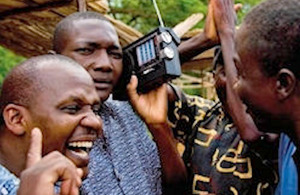DFID Research: Media in Kenya after the elections
DFID sponsors report by BBC World Service Trust which explores the role of the media in the Kenyan elections.

Cover image from Kenya 2007 Elections and their aftermath: the role of media and communication. Picture: Getty Images
A report produced by the BBC World Service Trust, and sponsored by DFID as part of the Communication research and policy programme has received widespread praise and is being taken seriously by policy makers in Kenya and elsewhere.
Kenya 2007 Elections and their aftermath: the role of media and communication written by programme director Jamal Abdi provides an accurate, rapid and succinct explanation of what had happened in Kenya, and uses the Kenya situation as a case study to highlight the links between media and democratic politics in fragile states, particularly during elections. The report has featured widely in the media, including in the BBC World Agenda magazine, the International Journal of Press and Politics as well as featuring in numerous blogs and websites.
Key findings in the study show how media have shaped and will continue to play a central role in shaping Kenya’s democracy:
- Kenya’s media lack freedom. Media freedom cannot be described simply in terms of independence from government; journalists and broadcasters also face commercial and political constraints
- some local language radio stations have incited fear and hatred particularly at the height of the violence. Talk shows on local language radio stations are routinely partisan and flout codes of ethics
- more recently, most local language stations appear to have been playing an important role in calming tension
- training in conflict reporting should be a major priority for journalists and talk show hosts
- debate on the media policy and regulatory environment in Kenya is likely to be intense and should be encouraged
- media monitoring by civil society and researchers discourages the broadcast of hateful messages by media organisations. Monitoring should be more systematic and better supported
- community media has, despite its small size, emerged from this crisis with much credit and arguably provides a model for the future. It requires better, more strategic engagement and support in Kenya and elsewhere
- the poor remuneration, status and safety of journalists are hampering development of a free media
- there is no independent public service broadcaster in Kenya. If there had been, the scale of the violence and of the crisis may well have been much less severe
- Kenya faces the most important public debate in its history. The media will be central this, and may need financial support if the debate is to be balanced
- coordination, information sharing and long term strategic planning of media support within Kenya could be substantially improved, ensuring that external media support is both demand-led and coherent
The report has already received significant interest from policy makers. A policy forum in Kenya on community media attended by the Kenyan Ministry of Information has welcomed the report, and it has proved to be popular with many Kenyan academics and NGOs. The report has also been presented to be considered by a Kenyan parliamentary enquiry.
Following publication of the briefing, DFID is exploring whether studies on the role of the media in advance of elections in other countries might be appropriate. The Communication Research and Policy Programme is collating existing research and experience within the Trust related to media and elections, particularly from Afghanistan, Angola, Bangladesh, Iraq, the Maldives, Morocco, Sierra Leone, Uganda and Tanzania.